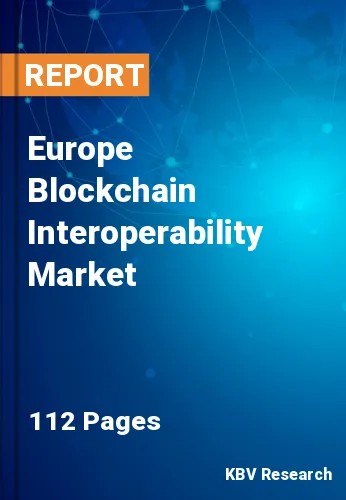The Europe Blockchain Interoperability Market would witness market growth of 27.5% CAGR during the forecast period (2023-2030).
The capability to set up network interoperability throughout multiple blockchains is a further advanced manifestation of blockchain technology's potential to decentralize systems and economies. In the future, there may be thousands of application-specific blockchains that communicate with each other through a decentralized primary center.
The interoperable future will enable users to interchange currencies from various blockchains directly within their purses, eliminating the need to locate an exchange service. As they pursue more profitable strategies, yield producers will have greater flexibility in relocating their assets across supply chains. As blockchain technology becomes more accessible, more organizations will implement it. According to industry titans such as IBM, the absence of blockchain-building standards impedes their interoperability. Implementing generally accepted, simple-to-implement blockchain solutions would lower this barrier to adoption.
The European Commission has significant policy, legal and regulatory, and funding support for blockchain technology. Building a pan-European public services blockchain, promoting legal certainty, promoting blockchain for sustainability, increasing funding for research and innovation, supporting interoperability and standards, supporting blockchain skills development, and interacting with the community are the most important aspects of its blockchain strategy.
Approximately 6.9% of German businesses currently employ or intend to employ blockchain technology for their business processes. This is the conclusion of a recent survey conducted on account of the Hanseatic Blockchain Institute by the IFO Institute. The chemical sector is in the lead, with 14% of businesses utilizing the technology for business processes. 13% of companies in the automotive sector utilize blockchain technology, and roughly 20% have intentions to do so. At least one in ten manufacturers of food and animal feed, data processing equipment, electrical equipment, printed matter, furniture, and machinery and equipment use blockchain technology or have plans to do so. These factors would facilitate the expansion of the European market.
The Germany market dominated the Europe Blockchain Interoperability Market by Country in 2022, and would continue to be a dominant market till 2030; thereby, achieving a market value of $143.7 million by 2030. The UK market is exhibiting a CAGR of 26.4% during (2023 - 2030). Additionally, The France market would experience a CAGR of 28.4% during (2023 - 2030).
Based on Solution, the market is segmented into Cross-chain Bridging, Cross-chain APIs, Federated or Consortium Interoperability, and Others. Based on Application, the market is segmented into dApps, Digital Assets/NFTs, Cross-chain Trading & Exchange, and Cross-chain Messaging & Data Sharing. Based on Vertical, the market is segmented into BFSI, Healthcare, Gaming & Entertainment, Telecommunication, Food & Agriculture, IT & ITeS, and Others. Based on countries, the market is segmented into Germany, UK, France, Russia, Spain, Italy, and Rest of Europe.
Free Valuable Insights: The Worldwide Blockchain Interoperability Market is Projected to reach USD 2.3 Billion by 2030, at a CAGR of 28%
The market research report covers the analysis of key stake holders of the market. Key companies profiled in the report include Oracle Corporation, R3, LeewayHertz, Ontology, INERY PTE. LTD., Datachain, Inc., Quant Network Limited, Band protocol, LiquidApps and Orb Labs.
By Solution
By Application
By Vertical
By Country
Our team of dedicated experts can provide you with attractive expansion opportunities for your business.

